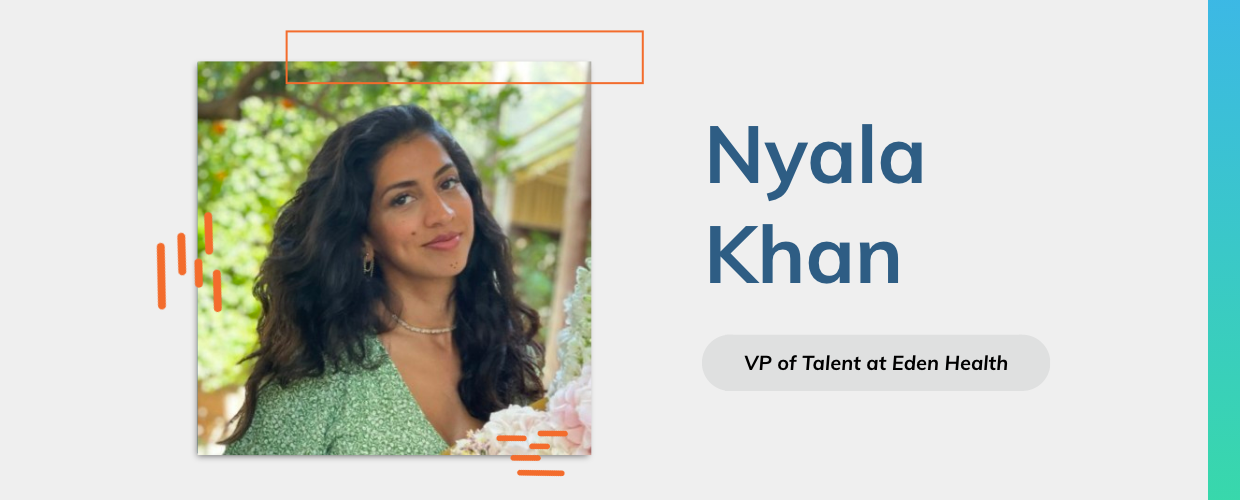Nyala Khan is the VP of Talent, Employer Brand and Experience at Eden Health, a primary care and insurance navigation company. She recently earned the recognition of being a 2022 People Pioneer, a peer-nominated award celebrating HR leaders who are pushing boundaries to positively impact their companies and employees.
We sat down with Nyala to learn more about her work at Eden Health, which includes leading the effort to grow the team from 19 to over 300 employees in 2021 with a composition of 65% women and 40% minorities by the end of 2021.
ChartHop: What are your responsibilities at Eden Health?
Nyala Khan: Throughout my career, I’ve specialized in developing culture and talent from the ground up.
I joined Eden when we had just 19 employees and have grown the team to over 300 people. I am now the VP of Talent and Employee Experience which entails two main focus areas: I ensure that we have the best-trained Talent Partners and interviewing teams to ensure we help grow our organization with the best possible hires. Additionally, I am responsible for programs that help engage, cultivate, and develop our employee experience at Eden Health. Our goal is ensure that employees experience fulfilling careers, build meaningful relationships, learn, and develop all while feeling supported.
CH: When thinking about instituting a fully sponsored benefits program (where the employer purchases insurance from providers for employees), what were some of the main considerations? Who did you involve and how did you get buy-in from the executive team?
We have always been aligned with the executive team that we will offer a fully sponsored option. We’re a company focused on employee health and wellness, so this was the natural course of action. We do give individuals the option to enroll in other kinds of benefit packages – our goal is to help individuals feel supported.
One example of this is our parental leave program. On top of 12 weeks of family leave, we also offer individuals $2,000/month for three months to help them transition back to the office. This allows parents to use that amount on anything from night nurses to child care to other supplies. We know not everyone’s family is the same but want to support in a way that is flexible enough for everyone to feel supported.
CH: You’ve been described as a “culture builder”, which really speaks to your impact. What does that mean to you and how have you applied it to your work at Eden Health?
NK: I prefer culture cultivator! To me, this means taking the mission of our company and the vision of our co-founders, and bringing that to life. I want to ensure that all of the employee experience strategies, decisions, and programs work toward that collective mission. This includes coaching, stretching perspectives and comfort levels, re-centering teams on decisions that significantly impact the mission, and working as a team to establish core values.
Examples of how this is applied have been foundational from who we bring into the company and the values we roll out, all the way through our creative approach to company programing including, talent and fashion shows, Evolution Offsite, My Reflections for Black History Month, and Love Week just to name a few.
CH: In looking beyond common tactics like name-masking, how did you bring data into recruiting and diversify the talent pool? What were some of the specific tactics used?
NK: I may have a more controversial approach, but I don’t believe the idea of tactics like name masking is the solution. If we blindly rely on the pipeline to diversify our output, we are naive in thinking we will make a change. Instead, we believe in explicit top-down alignment on achieving diversity of teams. For Eden Health, it’s never a blanket metric. Each team has its own obligation to reflect the diversity of our candidates in their own teams. We get tactical and drill down to the manager-specific demographics to identify the criteria and attributes that will balance under-representation in their team based on how it currently looks.
CH: Your team was able to achieve an employee base of 65% female and 40% underrepresented groups by the end of 2021. Were there any benchmarks you looked at to determine those goals? What were the biggest challenges you faced along the way?
NK: At Eden Health, we try to always be ahead of industry benchmarks. Our co-founders have always strived to be better than the status quo, and this attitude cascades down throughout the organization. We’ve built the entire team with an alignment and understanding that this is important to our company. Our goals around ethnicity and race have been an integral part of how we’ve grown the organization. When managers are hiring, they are challenged with the same explicit expectation that diversity is a key part of our business. This might mean you will need to wait an additional three weeks to fill a seat on your team, but building the team we need is more important than speed.
CH: It’s so important for compensation equity to be a priority. What made you realize it was necessary to conduct an audit? Were there any measures put in place to ensure parity on an ongoing basis?
NK: Our Head of Finance and I decided very early on that we need to purchase compensation data, carve it out for our size, choose a percentile, and stick to it. I then challenged myself and every future Talent Partner to hold the line. We learned very quickly that even the slightest space for negotiation with two people in the same position at the same level is a mistake and contradictory to our ethos. When we hire, we deliver the offer and provide an explanation of our salary levels.
When we did adjustments and cross-referenced the data by demographics, it was as clean as one could ask for. That said it wasn’t perfect, and we made some “out of equation” edits, so we could stand in front of the company and say no one person in each role/level has a difference of more than 2-3% between their peers, and this difference came after a performance-based merit increase was issued. We continue to curb the idea of negotiating and stick to the given median number in our market data.
This of course poses a challenge for hiring managers and Talent Partners when we absolutely don’t want to lose talent over comp. That is the sacrifice we made to ensure we maintained equity and integrity from the start for future scale.
CH: What are you most excited to accomplish in 2022?
NK: I’m really excited to expand our tools and systems we rely on to ensure transparency and facilitate connections.
In all seriousness, full implementation of ChartHop is a HUGE goal for us. We are about to impact organizational alignment and engagement in a way our teams and employees crave. We are remote-first and the majority of our teams will only see other employees in person once a year. This makes building trusted relationships with each other a major challenge, so we hope the ability to present ourselves a layer deeper with our custom profiles in ChartHop will support this.
CH: What is your advice to fellow people leaders looking to drive improvement and impact in the areas of culture and employee experience?
NK: I say this to my team often, but creating engaging employee experiences is so much more impactful when you center and focus the programming around your employees. This means having employees host events that they relate to and can share their experiences with. For example, for Lunar New year four employees shared how they celebrated the holiday including what foods their families ate, what traditional celebrations looked like, and what their favorite parts of the holiday was. It was educational, fully employee driven, and relatable for the entire team on the call. When you achieve this kind of employee driven experience, you will see a compelling difference in engagement.
More Lessons from the 2022 People Pioneers
Interested in even more lessons learned from HR leaders? Check out the full list of 2022 People Pioneers for inspiration on how to approach critical initiatives like embedding DEI into company culture, supporting employee well-being, and revamping performance management.





